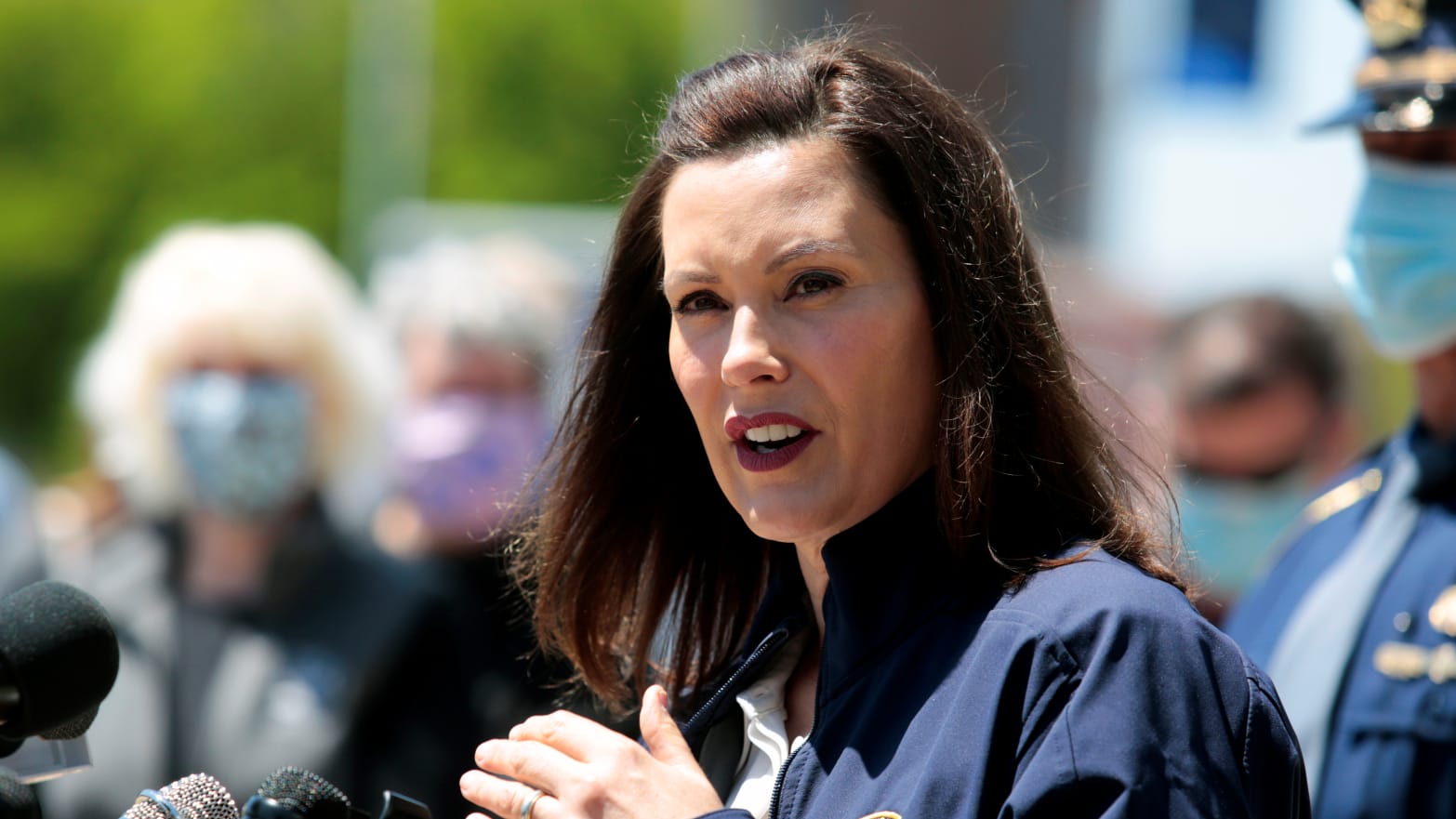Michigan Gov. Gretchen Whitmer is still reeling from the state’s highest court dismantling the authority she has used to fight the public health pandemic as the future of the state’s coronavirus response spirals into confusion.
In a 4-3 decision released Friday, the Michigan Supreme Court found that a key law relied on by the governor during the pandemic “is in violation of the Constitution,” according to the ruling, because it allowed the governor undue legislative power.
The move was a devastating political and policy setback for one of the leading Democratic voices during the coronavirus pandemic as the partisan fight over state restrictions continues to play out across the country.
“This is in my opinion a disaster that the Supreme Court ruled in this way,” said Rep. Yousef Rabhi, the House Democratic floor leader. “I would say that this is comparable to a dog chasing a car, and now that the Republicans have caught the car, they don't know what to do it with it because this creates a ripple effect throughout both public health and economic issues.”
But it was welcome news for Republicans who have long been critical of Whitmer’s approach as the months passed by during the pandemic. GOP leaders who control the state House and Senate had also earlier sued Whitmer over her use of emergency executive authority in a separate case from the state Supreme Court decision, according to a May press release from the Senate majority leader’s office.
In an interview with The Daily Beast, House Majority floor leader Triston Cole said his “constituents have felt that their voice was shut out from the process because of the governor using exclusively executive orders.”
“At this point in time it's important that we try our best to get Michigan back to normal economically and get our businesses functioning that have been forcibly put out of business by now what is deemed an unconstitutional action by the governor,” Cole said.
As of Monday, Michigan has more than 128,900 confirmed cases during the pandemic, according to state health data, with 6,816 deaths as a result. In another portion of the decision, the high court was unanimous that Whitmer lacked the authority to continue the state of emergency after April 30 on her own by using a different emergency act, according to the ruling.
The ruling will create a “significant change” on the state’s coronavirus response, said Meryl Chertoff, executive director of the Georgetown Project on State and Local Government Policy and Law.
“It's going to impede (Whitmer’s) ability to efficiently manage the crisis because it’s going to eliminate the flexibility inherent in executive management,” Chertoff said.
The emergency authority used by governors in an effort to keep the public safe has been a fraught political issue during the pandemic. Democratic governors across the country have faced criticism and legislative and legal challenges from Republicans in their states to the moves as the attempts have tried to undercut the elected leaders stricter responses and public health measures.
But the implications in Michigan are especially intense, given its standing as a critical swing state that has been fertile ground for political fights as the pandemic has raged on and anti-restriction protests have provided troubling scenes on the statehouse grounds.
And with roughly a month to go before election day, the dynamics have only grown more complicated with the decision from the state’s high court.
“Accordingly, the executive orders issued by the Governor in response to the COVID-19 pandemic now lack any basis under Michigan law,” the majority opinion issued Friday said.
The governor slammed the ruling following its release Friday, saying in a statement the decision from “a narrow majority of Republican justices, is deeply disappointing, and I vehemently disagree with the court’s interpretation of the Michigan Constitution.”
While the setback for Whitmer is among the more notable examples of authority being rolled back during the pandemic, she hasn’t been alone.
Other prominent examples include the legislative effort already underway in Louisiana by Republicans to cut into the Democratic governor's emergency powers. And in Wisconsin, Democratic Gov. Tony Evers’ administration response to the pandemic was struck a major blow back in May when the state supreme court tore down the state’s safer at home order.
Like many Democratic governors, Whitmer has embraced statewide restrictions during the pandemic including a mask mandate. But in the aftermath of Friday’s ruling, Whitmer said in the statement she believed she had “at least 21 days,” before the ruling formally gutted the authority she’s been relying on as the pandemic has played out.
By Sunday, the office of the state’s Democratic attorney general announced in a statement that she “will no longer enforce the Governor’s Executive Orders through criminal prosecution.”
“However, her decision is not binding on other law enforcement agencies or state departments with independent enforcement authority,” a spokesperson for the attorney general said in the statement. “It’s her fervent hope that people continue to abide by the measures that Governor Whitmer put in place - like wearing face masks, adhering to social distancing requirements and staying home when sick - since they’ve proven effective at saving lives.”
Whitmer’s administration filed court papers Monday in an attempt to make clear that the earlier opinion wouldn’t take effect “until 28 days after its issuance.”
But the leading Republican in the House made clear hours soon after that he disagreed. According to The Detroit Free Press, GOP House Speaker Lee Chatfield told reporters the “opinion takes immediate effect,” and also made clear lawmakers will return to the legislature because of the situation.
The uncertainty Monday only further added to the alarm in the state, with Whitmer’s office warning in a press release “if the ruling went into effect immediately, up to 830,000 Michigan workers and their families could lose crucial unemployment benefits.”
“The Supreme Court has spoken, and while I vehemently disagree with their ruling, I’m ready to work across the aisle with Republicans in the legislature where we can find common ground to slow the spread of the virus and rebuild our economy,” Whitmer said in a Monday statement.
As a result of the ruling last Friday, Peter D. Jacobson, professor emeritus of health law and policy at the University of Michigan, said Monday morning he expected some of the governor’s orders to be transferred to the state’s public health code instead. But that isn’t without drawbacks and could lead to a “wave of litigation,” Jacobson said.
By Monday afternoon, the director of the Michigan Department of Health and Human Services announced that he had formally put in place gathering restrictions and detailed mask requirements, according to the order.
And Jacobson remains concerned that the ruling “reduces the accountability, responsibility and flexibility of the governor to take action to protect the public.” Though he had no illusions that the courts would allow the governor’s orders to extend on "in perpetuity,” the latest major action from the state’s high court still worried him
“Instead of being able to rely on the governor’s executive authority, the state will need to rely on the governmental public health system to address the ravages of the pandemic,” Jacobson said.

